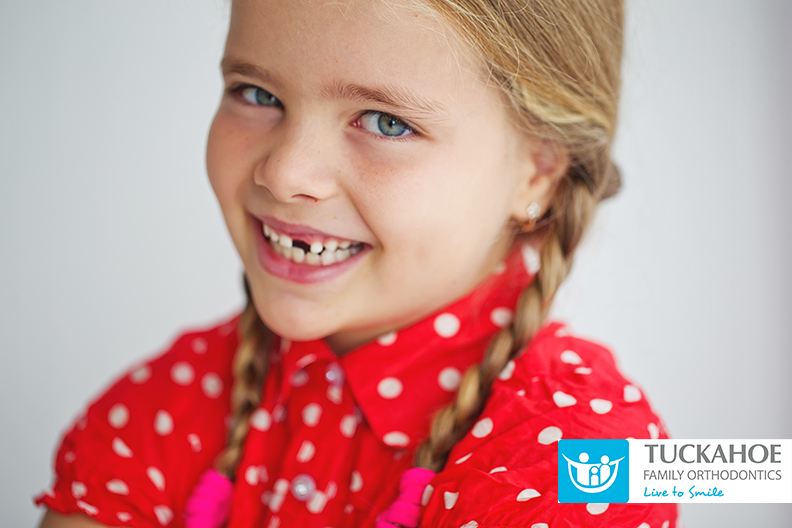Tuckahoe, NY – Orthodontists commonly get questions from parents about when a child’s baby teeth are supposed to fall out, especially since the ideal time to visit an orthodontist is at the age of 7. Should parents worry if their child’s teeth aren’t falling out?
It’s common for parents to be focused on a child’s developmental milestones. We love noting when they first crawled, walked, spoke, etc. Losing the first baby tooth is also a big moment, but what should parents be looking for as far as when the baby teeth will start to fall out?
“Children will typically lose their first tooth around the age of six,” says Dr. Sam Polan of Tuckahoe Family Orthodontics. “Some may be earlier, and some may be later, but by the age of 8, the average child has lost 8 baby teeth. These are generally the top four front teeth and the top four bottom teeth.”
After this initial loss of teeth, there is usually a bit of a break. The average child won’t lose teeth between the ages of 8 and 10, making it a great time for interceptive orthodontic treatment to begin, if indicated. This is a time when your orthodontist can help ensure the jaws are developing properly and the permanent teeth are erupting as they should and make any interventions as needed.
Once your child turns 10, you can expect the remaining teeth to begin falling out. Most children will lose their baby teeth by the age of 13. Girls typically lose their baby teeth faster than boys and may find their baby teeth have all fallen out by the age of 11.
Many parents may have questions about their child’s tooth loss or may wonder if their child is following the proper schedule, especially in the two years where tooth loss takes a bit of a break. However, most parents don’t need to worry. There are some signs you can look for, though:
- Lack of space in your child’s mouth. If your child’s mouth is small and the teeth are crowded, there may not be enough for the permanent teeth to erupt.
- Missing teeth. On some occasions, a patient may have a congenitally missing tooth. We can identify this with an X-ray, and then plan to account for that.
- Extra teeth. Some patients may have extra teeth that can block the eruption of a permanent tooth. Again, and X-ray can help us determine if this is an issue, or if your child is just developing at a slower pace.
“As with everything, it is important to remember that each child develops at his or her own pace,” says Dr. Polan. “Just because an older sibling lost his first tooth at the age of five doesn’t mean the next sibling will. It is important to maintain a relationship with a pediatric dentist so your dentist can ensure your child’s smile is healthy and progressing as it should. Then at the age of seven, your child should visit an orthodontist.”
Your child’s baby teeth play a very important role in their future smile. They preserve room for the permanent teeth, so if a baby tooth is lost too early, it can affect how the permanent teeth erupt. Likewise, baby teeth that take too long to fall out an also negatively impact how the permanent teeth can come in. Therefore, creating a relationship with an orthodontist is important. Your orthodontist can monitor your child’s growth and begin treatment at precisely the right time to have the most positive impact on the smile.


No Comments